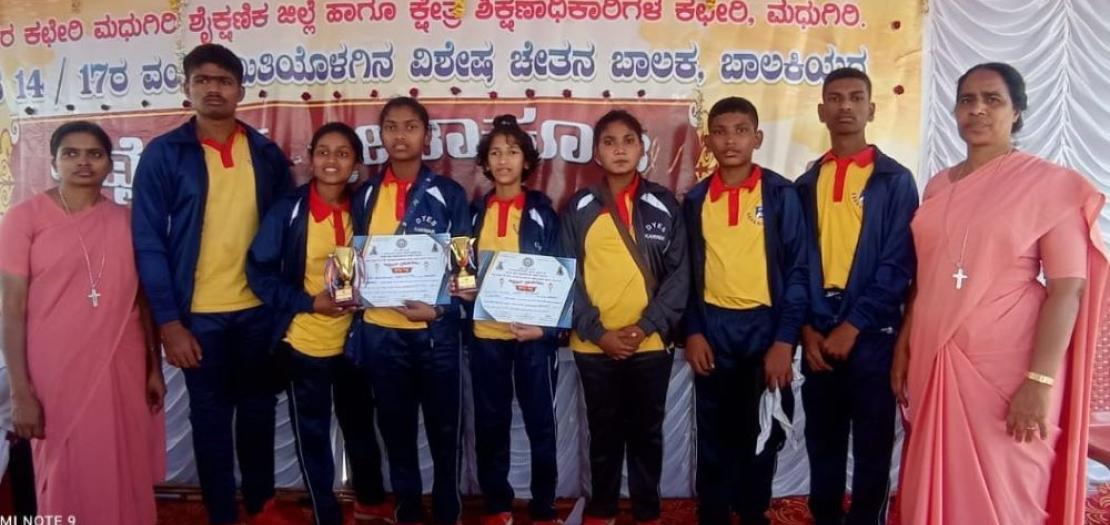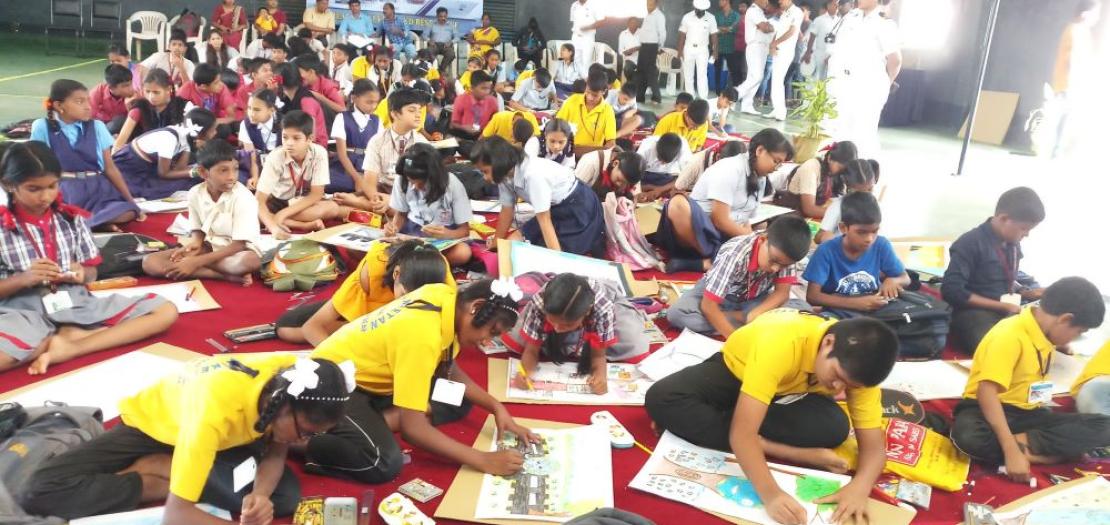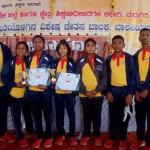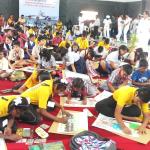Issued by the Catholic Center for Studies and Media - Jordan. Editor-in-chief Fr. Rif'at Bader - موقع أبونا abouna.org
Prasad James cannot hear the roar of the sea, but can paint the beauty of the waves.
"I have painted the charming Karwar beach, its waves, fishermen with their boats, tourists, and the beautiful sunset," James told Global Sisters Report in sign language, translated by his teacher, as he showed his works.
The sixth grader is among 48 children currently studying in Asha Niketan (House of Hope) Deaf School, a residential school for children who cannot hear or speak managed by the Sisters of the St. Joseph of Chambery, a French congregation, for the Karwar Diocesan Development Council.
The center, founded in 1996 near a beach in Karwar on the Goa-Karnataka border, is the first church-managed school for children with hearing impairments in Karnataka state's northern region. It now caters even to villagers of Maharashtra, Karnataka's northern neighbor.
"Children seem to enjoy their silent world, but we really struggle to get into that world," said Sr. Tresa Irudayasamy, one of three nuns who live on campus and teach the students in sign language.
The nun, who's been the hostel warden for four years, has built a good rapport with the children, but said she still struggles in the classroom to teach them.
"We use our universal language of love and care mostly, and it works better than our sign language," she told GSR with a smile.
But Sr. Lynette Lopes, who took over as the school headmistress four months ago, said the language of love alone is not sufficient.
This is mainly because India has no common sign language to use in schools for people with hearing impairments, who total about 5 million children, according to the latest national census, conducted in 2011.
The census report recommended the government develop an official sign language for the country.
The World Health Organization estimates that India has about 63 million people who have complete or partial deafness.
"The needs of the deaf community have long been ignored," lamented Sr. Isabel Britto, Asha Niketan's co-founder, who is now in Bengaluru, Karnataka.
Asha Niketan has 10 teachers, all trained in special education, but they mastered the skills to teach in sign language on the job.
Sugandha Nayak, a teacher of more than 20 years, told GSR that she has mastered sign language after years of practice with students.
Sr. Elizabeth Rani, who took over the school from Britto in early 2000, also struggled to learn sign language to teach the syllabus prescribed by the Karnataka government.
"First I did a diploma course in sign language, which was based on an American syllabus, but it did not work with our students," she told GSR.
Academic sign language in India varies from region to region, she explained.
Though the Indian government in 2014 developed a uniform sign language, "it is not meant for teaching in schools," she said.
The government launched a national policy for people with hearing impairments only in 2007, but the services are limited, especially when it comes to educating deaf children, Rani said.
The elderly nun blames the "slow progress" on the limited number of professionals available in the field.
The country of 1.38 billion people has only 7,000 ear, nose and throat specialists, 2,000 otologists and around 250 to 300 certified sign language interpreters, she said.
"All this made our work really challenging in the beginning," she added.
She left Asha Niketan for a year, as she was afraid to lose her skills to communicate with hearing children if she continued in the same job, despite enjoying it.
"Our present batch too has many artists," said Irudayasamy, holding the hand of a recently admitted girl.
The nun said children excel in some extracurricular activity but everyone is interested in painting the world around them.
Irudayasamy regretted that society has many children with hearing impairments, "but only a few are lucky to study in special schools like Asha Niketan."
The school follows the state syllabus for their intermediary studies, but integrates life skills training and extracurricular activities, such as art, handicrafts and dancing, to help students become self-reliant.
When GSR visited the schools, the students competed to show their paintings, clay models, handicrafts and play materials.
Girls are particularly interested in dancing in addition to painting. Bhoomika, a ninth grader, said she has won state level dance competitions and brought trophies to the school.
Surya Santosh Marate, a ninth grader, drew the manger at Bethlehem that became the school's official 2023 Christmas greeting card. He told GSR that two of his three siblings cannot hear or talk.
"Our present batch too has many artists," said Irudayasamy, holding the hand of a recently admitted girl.
The nun said children excel in some extracurricular activity but everyone is interested in painting the world around them.
Irudayasamy regretted that society has many children with hearing impairments, "but only a few are lucky to study in special schools like Asha Niketan."
The school follows the state syllabus for their intermediary studies, but integrates life skills training and extracurricular activities, such as art, handicrafts and dancing, to help students become self-reliant.
When GSR visited the schools, the students competed to show their paintings, clay models, handicrafts and play materials.
Girls are particularly interested in dancing in addition to painting. Bhoomika, a ninth grader, said she has won state level dance competitions and brought trophies to the school.
Surya Santosh Marate, a ninth grader, drew the manger at Bethlehem that became the school's official 2023 Christmas greeting card. He told GSR that two of his three siblings cannot hear or talk.
Vinaya Prabha Rodrigues, a senior teacher, said the children are all genetically deaf, but can see everything. "They possess an extra quality for learning by observing things," she told GSR.
Some students come to the school from their homes in the neighborhood. "The sisters and teachers visit their homes during holidays," Rodrigues said.
Sebastina Fernandes, a social worker who has served Asha Niketan for 25 years, told GSR that the school finds support from the local community, district administration and the Indian Navy stationed in Karwar.
"Every year, the navy takes the children and teachers for a daylong excursion in the sea," she said. The navy provides the visitors food, gifts and entertainment.
James, who has painted the Navy Day, said they look forward to it so that they can "have a beautiful trip to the sea."
The school celebrates festivals of Hindu, Muslim and Christian communities. Government officials and community leaders attend the school's celebrations of the International Day of Persons with Disabilities.
Lopes said 90% of their students passed the 10th-grade examination last year.
"This year, 14 are attending the state examinations, and we expect a 100 per cent result," she said, as students who gathered around her showed a thumbs up sign.
Fr. Lawrence Fernandes, who headed the diocesan development council for 12 years, recalled that the school opened in 1996 by then Bishop William D'Mello of Karwar with four children in a rented building on the seashore.
Although the school won the award for the best school for children who cannot hear or speak in 2009, it took three more years for the government to recognize and fund it, he told GSR. His successor, Fr. Steevan D'Souza, said that although Asha Niketan started as a diocesan initiative, the nuns have developed it as a credible institution.
For her part, hostel warden and teacher Irudayasamy — who had commented on the difficulties around sign language — said she's learned all the sign languages that "make my children happy," she told GSR.
"The most I used is my smile that makes them smile, too."











